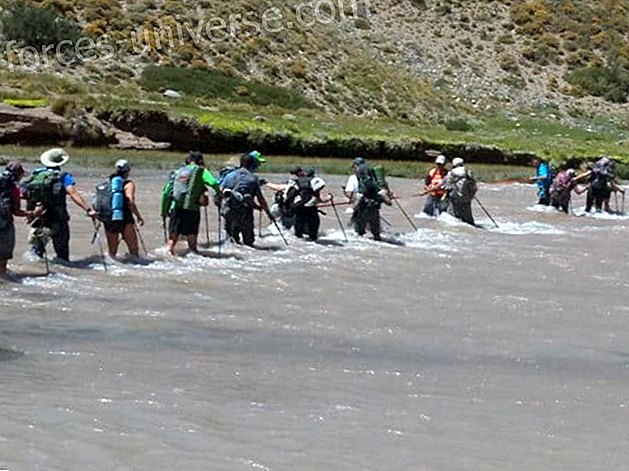
Adriana P rez Pesce 12/16/10 In the Solidarity Economy Category
[fundacionequilibri] The Equilibri Foundation is a non-profit organization that executes social and university education projects in the lowest income countries. The basis of the financing to carry out its objectives is given by the comprehensive services of program development, systems maintenance, networks and IT consulting offered to different entities, mainly from the Third Sector.
We will have a fairer world when we achieve a better balance between the different countries. We imagine a planet covered and sustained by the rich fabric of a relational network and knowledge that allows no child, woman or man to be apart from progress and well-being. We believe that the path of true development necessarily goes through a good formation, they express from the foundation.
The more than 230 students who have so far benefited from the program - 53% have been women - are just steps away from becoming doctors, teachers, agronomists, dentists, lawyers, computer scientists, industrial engineers and nurses.
Below is the interview that Positive News held with the Head of Cooperation Projects of the Equilibri Foundation, Amanda Fernández:
Positive News: How did the idea of promoting social projects and university training in Bolivia arise?
Amanda Fernández: The program began in early 2005 so that young people in the most disadvantaged rural areas of Bolivia receive complete and quality training within their country and can later contribute their knowledge and experiences to their communities. It is carried out in collaboration with the different social agents that can directly influence rural development. In this way, the local communities together with our counterparts have a leading role in the incorporation and empowerment of young and future community leaders, applying at all times the gender perspective to guarantee equity between men and women.
N +: How are the programs funded?
AF: To materialize the aid, microcredit is used, a financial instrument that allows the future sustainability of this project. The student receives a monthly amount that serves to cover their basic needs. Once graduates have their work status in mind, they return the credit so that another student can benefit from this fund. The training includes the completion of annual internships in rural communities, English courses, computer science and other training that help complement the student's academic curriculum. They also have academic and psychological monitoring so that they feel supported at all times. In addition to university education, there are several university canteens installed in Sucre and Potosí, which provide a healthy, nutritious and balanced diet, at a reasonable price.
N +: What are the most demanded university careers?
AF: Engineering, especially agronomists and civilians. Young people are very aware in helping their communities and families. This motivation makes them choose careers with which in the future they can help the sustainable development of their regions. Medical and teaching professionals follow closely.
N +: Do you remember any special experiences you would like to share with N + readers?
AF: We are especially excited to know that some of the benefited students end up integrating in Equilibri Foundation in Bolivia and that they are the maximum responsible for the social projects that we are carrying out. Who better than them to start the projects, capture the needs and strategies and interact with the parties involved? They are the engine of the country's development. Your effort and enthusiasm because social projects go well and succeed, encourages us from here to work more and better.
N +: Does the Equilibri Foundation also participate in projects related to fair trade?
AM: Yes, we believe it is another cooperation tool. We have among other items, puppets that come from Bolivia and that we sell under the name of DiverDits. They are made of 100% wool, woven manually by the Nueva Esperanza women's association in the Chutahua area, in Potosí. The benefits obtained from the sale return to the community of the association, where the ladies invest it in the needs they deem most suitable for the development of their rural communities: literacy, use of weaving machines, infrastructure and sanitation. For example, thanks to the sale of DiverDits, they have been able to provide drinking water with a large part of their communities' homes. At all times, our managers who work in Bolivia supervise the project in a close way, since the vast majority are also indigenous people who know the real needs of their neighbors and families. On the other hand, we want to show the culture of the country through the DiverDits and Bolivian folk tales, which we sell together with a didactic CD, which I like very much, especially to the youngest. We also have scarves, tapestries, pencil DiverDits and national folk tales (*).
N +: What response do you receive from the companies to which you offer your services when you know that you carry out social tasks?
AF: In general, we work and provide computer services mainly to third sector and public sector entities but we are also working for the private sector, so that we encourage and promote corporate social responsibility. In the end, the more technological projects we carry out, the more social projects benefit. The private companies that work with us are aware that, apart from receiving a professional and competitive service, the benefit obtained is used in solidarity and commitment. It represents an added value for them to the technological services we offer.
N +: Do you plan to add any other country to your initiative?
AF: There are proposals to start new projects in other countries and regions but the problem is the current economic crisis that affects us all. In our case, the financing of these projects comes largely from the benefits obtained by the computer services we offer and at the moment they are not enough to meet new challenges in other countries. We hope that in the near future we can work with more beneficiaries from other cultures.
CONTACT INFORMATION:
http://www.fundacioequilibri.org
Photography: Courtesy of the Equilibri Foundation.






